How to Build a Successful Water Polo Program, Featuring CSUMB’s Emily Schmit
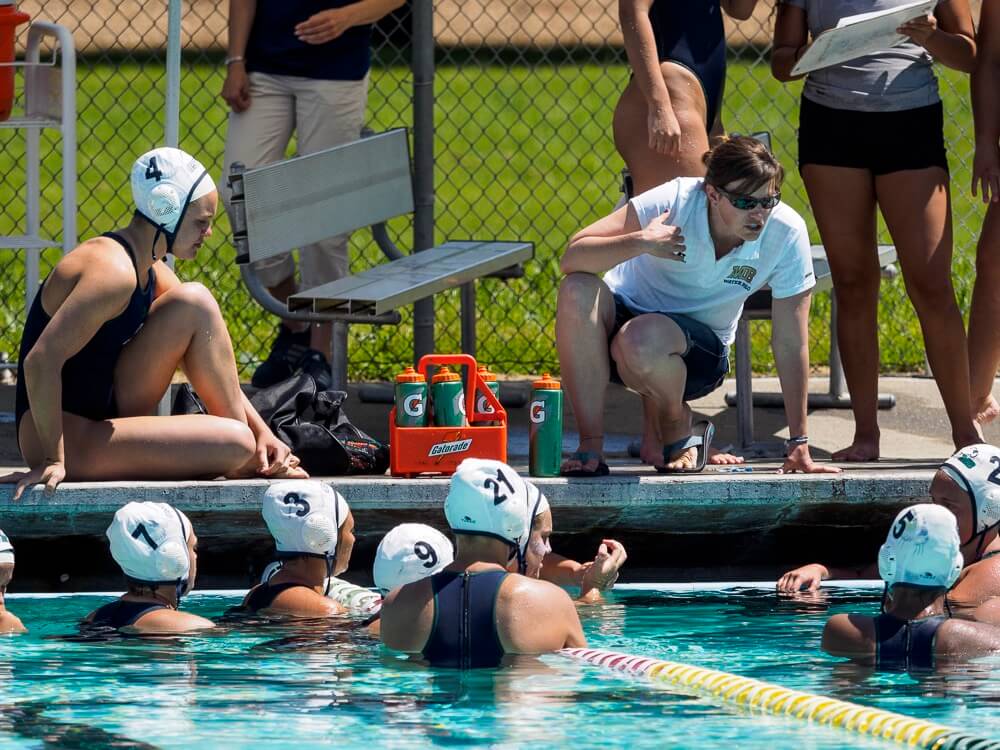
Water polo is a niche sport that has been gaining momentum throughout the country, yet not many people understand the ins and outs of the sport quite like Cal State University, Monterey Bay’s head coach, Emily Schmit.
“It’s such a dynamic sport. You’re playing overhead by handling and throwing a ball, and you’re constantly having to change directions, which requires a lot of core and leg strength. You have to master wrestling in water while listening to whistles. Understanding all the rules can be a challenge,” Schmit says. “In polo, you have to do it all really well.”
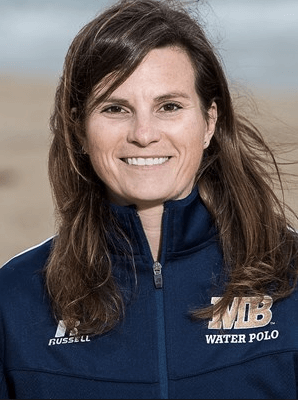
Photo Courtesy: CSUMB Athletics
Now entering her 17th year of coaching the sport (13 of which were at the collegiate level), Schmit claims that she never dreamed she’d be sitting in an office overlooking the beautiful muraled walls of CSUMB’s pool. “I’m so grateful and fortunate to be able to do exactly what I’ve always wanted to focus on – coaching!” she says.
Schmit was honored as the Southwest Conference Coach of the Year for the both the women and the men in 2007 and the women in 2008 for the University of Arizona, and she was awarded with her fourth Sierra Pacific Conference Coach of the Year Award in 2016.
Looking back on her coaching accomplishments, the question arises: how did this California native and Indiana University grad develop mediocre teams into water polo strongholds?
Read on to find out.
Humble Beginnings
Most polo players start as swimmers, and Schmit is no exception. She came from a competitive swimming background, but her training took a turn after suffering a knee injury from playing land sports. Her coach grew tired of the multiple injuries from impact sports during the off-season, so he decided to start a water polo team. She never looked back.
“I started to play and fell in love with it! Water polo is the combination of swimming – which I had been doing my entire life – with wrestling, throwing a ball and scoring goals. All of those things I was craving on land became a reality in the water!” she fondly recalls. “I played center defender because I had a lot of fight, both in life and in sports.”
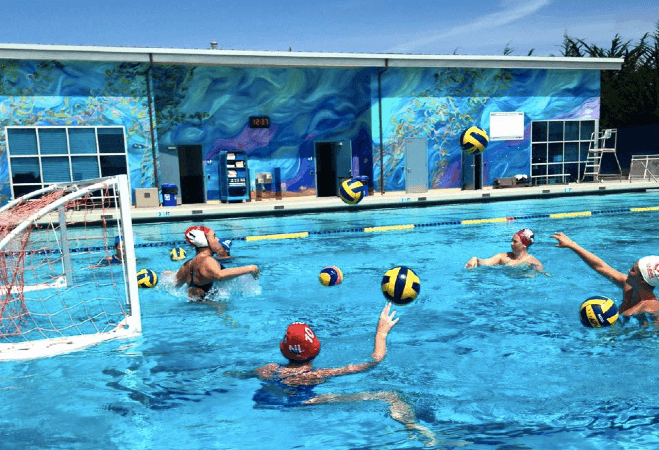
Photo courtesy: Cal State Monterey Bay Water Polo
Taking it to the Next Level
Graduating after only two years of high school water polo, Schmit knew her playing days were just getting started. She decided to take her talents to Indiana University, bringing them to the national championship tournament in 1997 and 1999.
“In college, I was too small to be a center player and switched to a strong side attacker,” Schmit reflects on the transition from high school to college water polo. “I was the runt of the family, so I always had to be a little bit meaner and a little bit feistier in order to hold my own.”
The switch to playing a Division I sport and balancing academics can be a challenge, but Schmit used her inner drive to excel in this environment. She graduated with a bachelor’s degree in history and gender studies in 2001 with an unquenchable thirst for higher education.
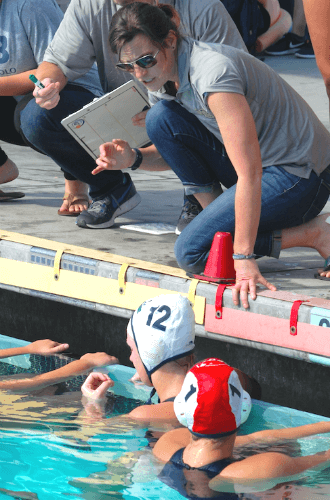
Photo Courtesy: CSUMB Athletics
Post-grad
After college, Schmit needed a cooling-off period. “I was a little bit burnt out when I moved back to California, and my brother’s high school needed a polo coach. Jenny White pushed me out onto the pool deck, put a t-shirt over my head and made me start coaching.”
After three years of high-school coaching, Schmit attended the University of Arizona for law school. “I thought that was the end of my coaching career, but within my first year at Arizona, the women’s water polo program needed a new coach. I thought, ‘I can do it! Why not?’ We went from being a top 10 team to a top 4 team.”
After seeing Schmit work her magic with the women’s team, the men’s team approached her to take over their program.
Turning Point
There she was, getting her master’s degree, working as a graduate teaching assistant, going to law school,
and coaching two water polo teams. “Someone asked me how I was coaching water polo while going to law school. I immediately thought, ‘How am I going to law school while coaching water polo?’ And that’s when I realized that my career path needed to change,” Schmit recalls.
Water polo had taken center stage.
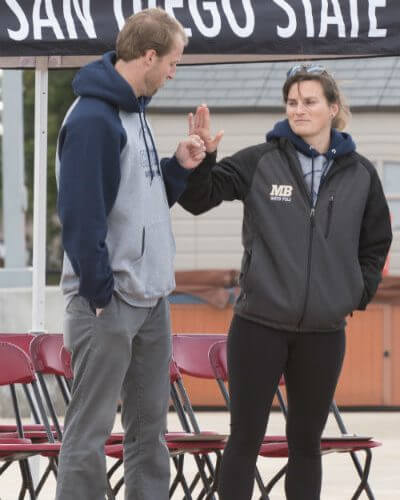
Photo Courtesy: CSUMB Athletics
The Next Step
After graduating from the University of Arizona with a Juris Doctorate and Master of Arts degree in Women’s Studies, Schmit continued to build her coaching resume. She coached for De Anza college from 2008 to 2011, then moved on to Pacific University until landing a position with the Cal State Golden Bears. Schmit led the Golden Bear club team to the 2015 national collegiate championship.
Riding this wave of success, Schmit accepted the head coaching position for the relatively new CSUMB’s women’s water polo team in 2016. Known for making good teams into great teams, Schmit immediately set to work building not only incredible athletes but also incredible people.
“CSUMB water polo is up-and-coming. We have been under-seeded, and I’m seeing a lot of growth. I’m excited about what’s happening here!” Schmit says.
Looking Outward: Sharing the Steps to a Successful Polo Program
Schmit hopes that water polo will gain more momentum throughout the country and lights up when asked to share her wisdom. The principles she shares below will lead to a stronger, healthier program.
Creating & Sharing Your Coaching Philosophy: No coaching style is the same, so no magical coaching philosophy exists. You just have to own your style while meeting athletes on their level.
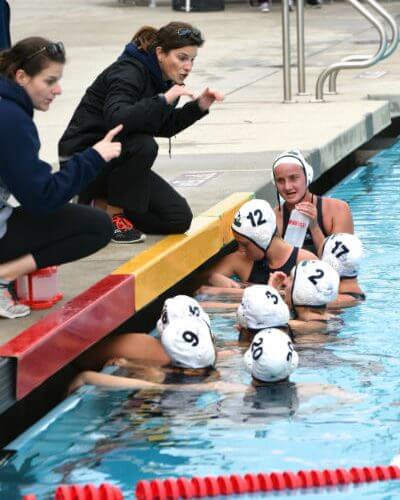
Photo Courtesy: CSUMB Athletics
Schmit describes herself as intense and yells when necessary, yet she’d rather the intensity come from the players pushing one another rather than the coach. Ultimately, the players must be having fun. When they’re having fun, they’re also able to push themselves harder.
“I think that my philosophy and coaching style are very much the same. I can push you harder if you’re having fun. My athletes are student-athletes, and if my student-athletes can come out of college saying they’re a better water polo player, graduated college and they’re a better human out of it, then I’ve done my job,” Schmit says.
Establishing Summer Programming: Summer camps promote your school and build up the next generation of athletes. If they like what they see, then they’ll spread the word and boost your program!
Schmit started the Otter Water Polo and Swim Camps to train both boys and girls ages 13 to 18 at CSUMB’s facilities. Boasting a beautiful outdoor pool located only a 10-minute jog to the beach, these campers are bound to have an incredible time. Click HERE for more camp information!
Promoting Leadership: Teams can easily crumble under poor leadership. All players can become better leaders by knowing themselves and their teammates.
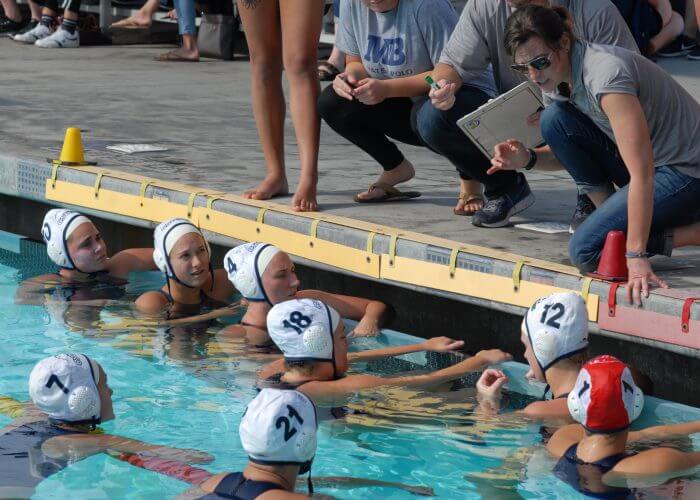
Photo Courtesy: CSUMB Athletics
Schmit meets with a few groups to discuss readings and how to develop leadership within the team, and the entire team takes the DiSC personality test together to talk about their results. “Giving athletes those types of insights into themselves allow them to develop more fully. It helps them to see where they can step up and push their teammates and where they can step back and let others take those leadership roles,” Schmit says.
Practicing Mental Training: A huge part of mental training lies in becoming aware of our inner dialogue. Many of Schmit’s athletes aren’t even aware of the voices they’ve carried from the past into the present, saying that “our negative voices get a lot more air time than positive self-talk. I work with each athlete on carrying the voice that will benefit them.”
The women on CSUMB’s team have power words or phrases (sometimes written on their hands) in order to remember what they need to be saying to themselves to get the results that they want.
Emphasizing Technique: Although the game of water polo demands extreme athleticism above the water, they must fundamentally be strong swimmers.
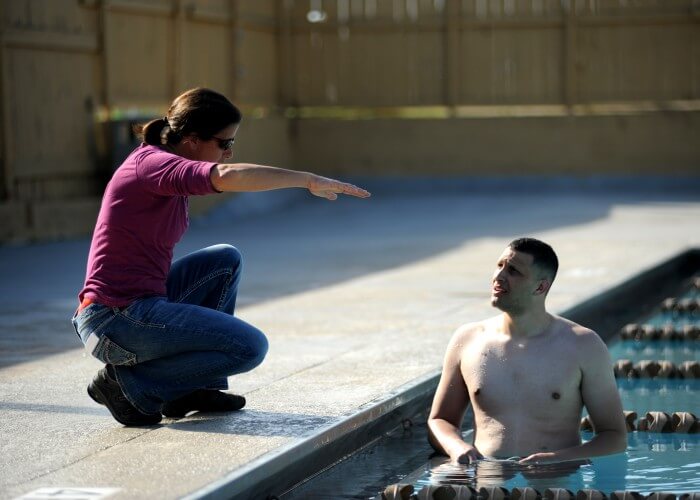
Photo Courtesy: Lance Cpl. Michael C. Guinto
Schmit emphasizes the basics of proper body movement and swimming technique in training: “Swimming is so very important to our sport, and it’s hard when polo players come in thinking that it’s not important and have poor stroke technique. Their shoulders are gutted and knees hurt. I really go back to basics and making sure technique is there.”
Having Good Mentors: A good mentor is someone who has walked a similar path and can encourage you with sound advice. Schmit credits her high school coaches, Megan Hernandez and Aileen Finney, with exemplifying excellent coaching: “They took me and turned me into a water polo player. They pushed us hard but were also very patient. They did an excellent job of breaking down skills and teaching them.”
Schmit also points to Simone La Pay as a huge supporter when doubts entered her mind about becoming a full-time coach.
It’s All About Perspective
Sometimes, coaches and players can get so wrapped up in their small worlds that they forget what truly matters. A wise coach will treat the athletes as dynamic and multi-faceted people.
“My athletes are student-athletes, and if my student-athletes can come out of college saying they’re a better water polo player, graduated college and they’re a better human out of it, then I’ve done my job,” Schmit says.
Now take Schmit’s wisdom back to your teams, and don’t forget to have fun!



